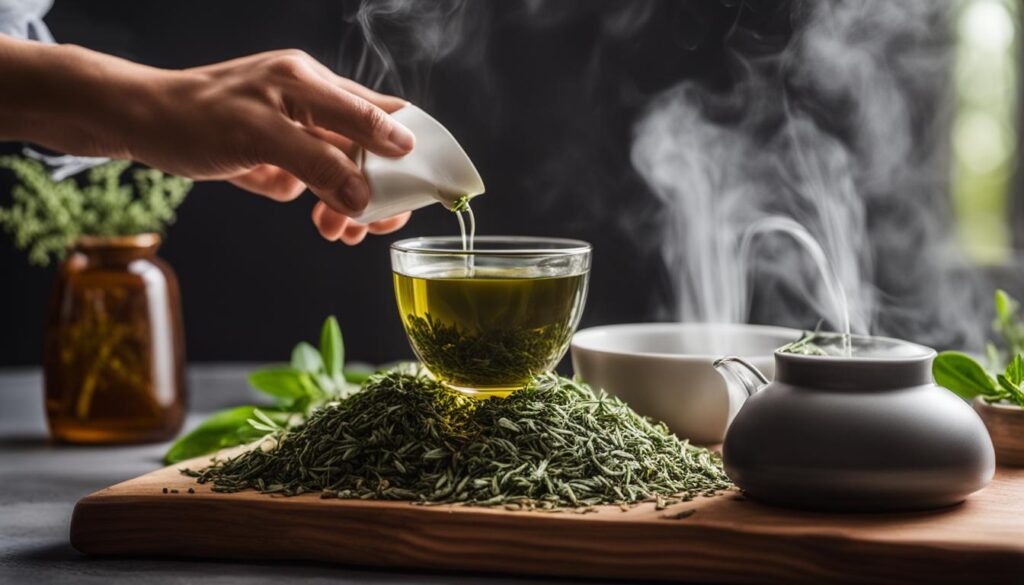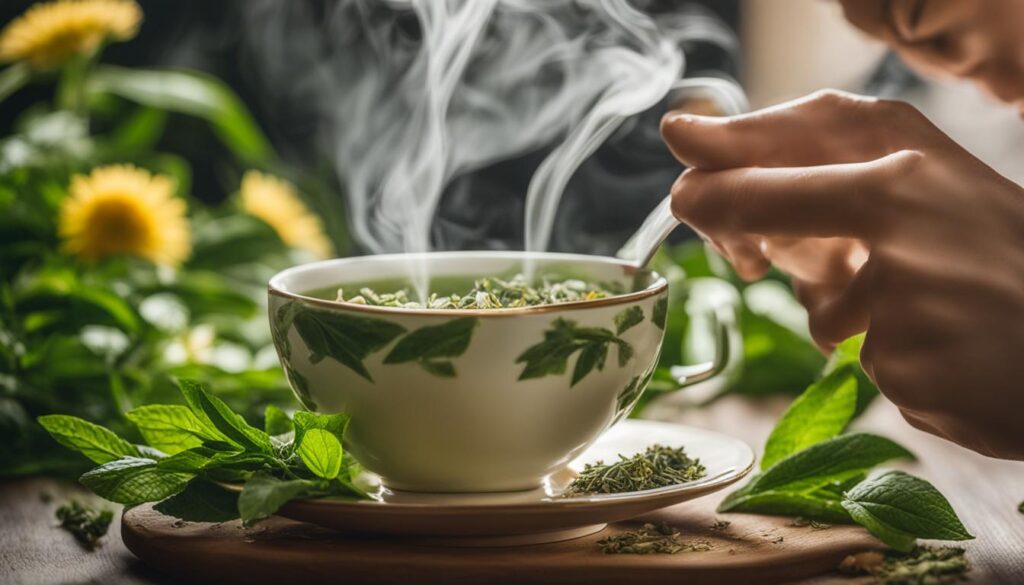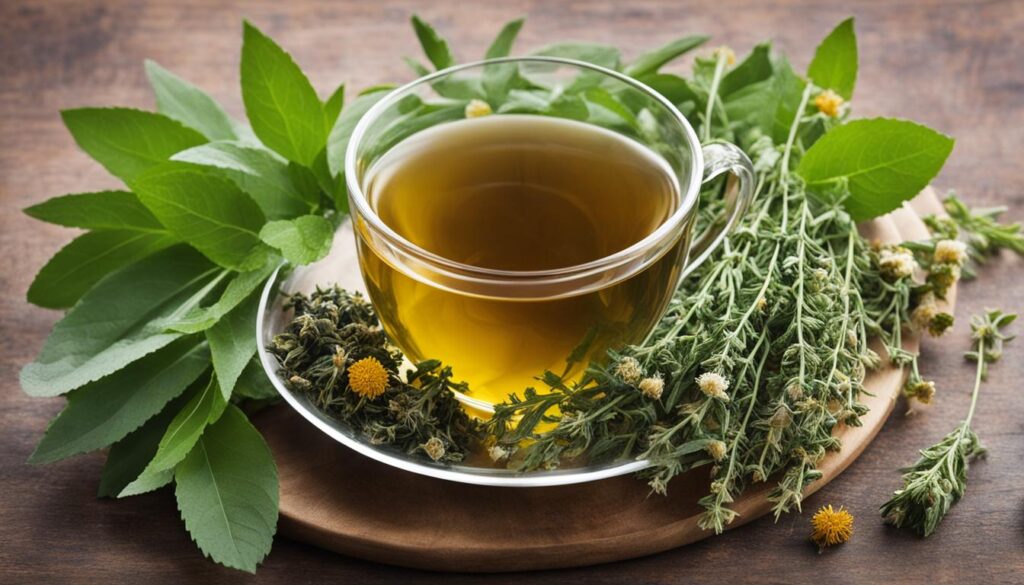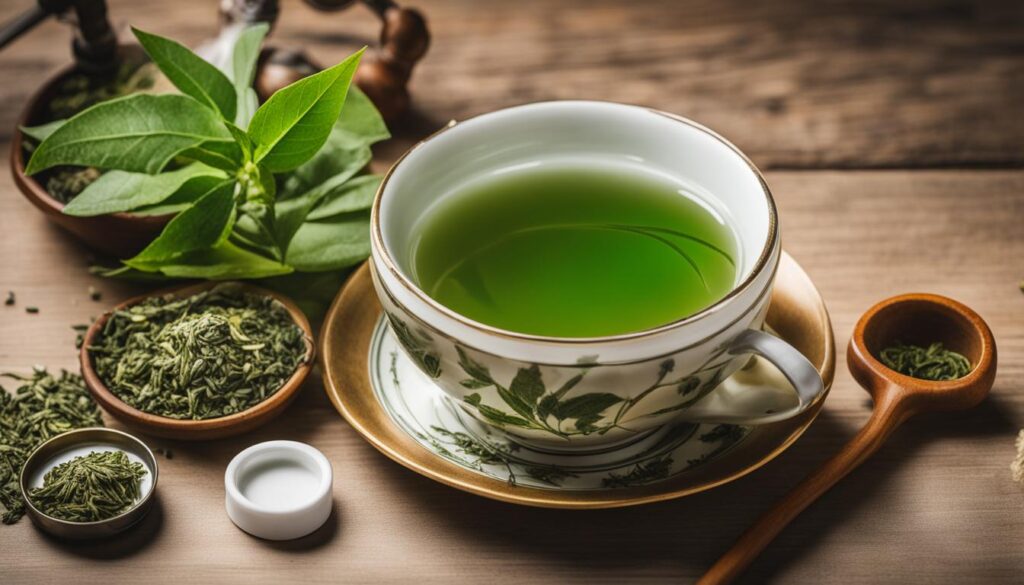Are you struggling with sinus issues and looking for a natural remedy? Look no further than green tea! With its rich antioxidant content and numerous health benefits, green tea can be a soothing and effective aid in managing sinus problems. Let’s explore the benefits of green tea for sinus relief and discover some helpful tips to make the most of this natural remedy.
Key Takeaways:
- Green tea is rich in antioxidants and offers multiple health benefits.
- It helps support the immune system and reduce inflammation in the sinuses.
- Proper brewing techniques enhance the effectiveness of green tea for sinus relief.
- Other herbal teas like echinacea, peppermint, and chamomile can also provide relief.
- Consult a healthcare professional for personalized advice and treatment.
What is a Sinus Infection and its Symptoms?
A sinus infection, or sinusitis, occurs when the tissue lining the sinuses becomes inflamed and swollen. Common symptoms include:
- Cold symptoms that do not go away
- Runny or stuffy nose
- Congestion
- Cough
Other symptoms may include:
- Headache in the forehead area (sinus headache)
- Facial and eye pain
- Fever
- Fatigue
Sinus infections can be caused by various factors, including viral or bacterial infections, exposure to pollutants, allergies, and other medical conditions.

| Symptoms | Description |
|---|---|
| Cold symptoms that do not go away | Common cold symptoms persist for an extended period |
| Runny or stuffy nose | Nasal discharge or congestion |
| Congestion | Feeling of fullness or blockage in the nasal passages |
| Cough | Unproductive cough |
| Headache in the forehead area (sinus headache) | Pain or pressure in the forehead or face |
| Facial and eye pain | Discomfort or aching sensation around the eyes and face |
| Fever | Elevated body temperature |
| Fatigue | Feeling exhausted or tired |
Risk Factors and Prevention of Sinus Infections
The risk of developing a sinus infection can depend on various factors, including air quality, exposure to pollutants, and personal health. Sinus infections can affect individuals of all ages, from children to adults. It is important to be aware of these risk factors and take preventive measures to reduce the likelihood of experiencing sinus issues.
Air Quality and Sinus Infections
Poor air quality can contribute to the development of sinus infections. Exposure to pollutants such as dust, smoke, and allergens can irritate the sinus lining and increase the risk of infection. It is advisable to minimize exposure to these pollutants by ensuring good ventilation in living spaces, using air purifiers, and avoiding smoke-filled environments. Additionally, maintaining a clean and dust-free home can help improve air quality and reduce the risk of sinus infections.
Sinus Infections in Children and Adults
Sinus infections can affect individuals of all ages, but there are some differences in prevalence and symptoms between children and adults. Children are more prone to developing sinus infections due to their underdeveloped sinus cavities, weaker immune systems, and increased exposure to respiratory infections in school or daycare settings. Adults, on the other hand, may experience sinus infections as a result of factors such as allergies, chronic nasal congestion, or structural abnormalities in the nasal passages.
Diet and Sinus Infections
Your diet can play a role in preventing sinus infections. Consuming a healthy and balanced diet that is rich in immune-boosting foods can help strengthen your body’s defenses against infections. Foods that are high in antioxidants, such as garlic and onions, can provide anti-inflammatory benefits and support sinus health. It is also important to stay hydrated by drinking plenty of fluids, as this can help keep the nasal passages moist and prevent dryness that can lead to sinus issues.
Sinus Infection Prevention Strategies
There are several strategies you can incorporate into your daily routine to prevent sinus infections:
- Use nasal saline rinses or sprays to keep the nasal passages clean and moisturized.
- Avoid known allergens or irritants that can trigger sinus symptoms.
- Incorporate immune-boosting supplements, such as vitamin C and vitamin D, into your diet.
- Practice good hygiene by washing your hands frequently and avoiding touching your face, especially during cold and flu seasons.
- Consider using essential oils, such as eucalyptus or peppermint, for their antimicrobial and decongestant properties.
By following these prevention strategies and taking proactive steps to maintain a healthy lifestyle, you can reduce the risk of developing sinus infections and promote overall sinus health.

The Benefits of Green Tea for Sinus Relief
When it comes to finding natural remedies for sinus relief, green tea emerges as a popular choice with numerous benefits. Packed with antioxidants, green tea provides the body with the necessary support to strengthen the immune system and combat infections. Its anti-inflammatory properties play a crucial role in reducing inflammation in the sinuses, offering soothing relief from the discomfort of sinusitis.
In addition, green tea boasts high levels of Oxygen Radical Absorbance Capacity (ORAC), making it a potent source of antioxidants that help fight free radicals and promote overall wellness. Regular consumption of green tea can significantly contribute to the alleviation of sinus issues while supporting better sinus health in the long run.

Green Tea Benefits for Sinus Relief:
| Benefits | Description |
|---|---|
| Antioxidant Rich | Green tea is packed with antioxidants that strengthen the immune system and promote overall wellness. |
| Anti-Inflammatory Properties | The anti-inflammatory properties of green tea help reduce inflammation in the sinuses and alleviate symptoms. |
| High ORAC Value | The high Oxygen Radical Absorbance Capacity (ORAC) of green tea makes it an excellent source of antioxidants, aiding in the fight against free radicals. |
By incorporating green tea into your daily routine, you can harness its beneficial properties and enjoy a natural approach to sinus relief. Keep reading to discover brewing tips for green tea and explore other herbal teas that can further enhance your journey to a healthier sinus.
Brewing Tips for Green Tea
To maximize the benefits of green tea for sinus relief, it is crucial to brew it correctly. Follow these brewing techniques to ensure a delicious and effective cup of green tea:
-
Use high-quality green tea leaves. The quality of the tea leaves significantly impacts the flavor and health benefits of your brew.
-
Choose the right brewing temperature. Green tea is delicate, and using water that is too hot can result in a bitter taste. The recommended water temperature for brewing green tea is around 175°F (80°C).
-
Steep for the optimal time. The steeping time may vary depending on personal preference and the intensity of flavor you desire. Generally, steeping green tea for 1-3 minutes is ideal.
-
Avoid overbrewing. Leaving green tea to steep for too long can result in a bitter taste. Experiment with different steeping times to find the perfect balance of flavor and effectiveness.
Proper brewing ensures that you extract the maximum amount of antioxidants and flavor from the green tea leaves, enhancing its overall effectiveness in providing sinus relief. Enjoy the soothing goodness of a perfectly brewed cup of green tea!
Tips for Brewing Green Tea:
“Using high-quality green tea leaves and steeping them in water at the right temperature will result in a flavorful cup of green tea.”
| Green Tea Brewing Techniques | Water Temperature | Steeping Time |
|---|---|---|
| Gyokuro (Japanese green tea) | 122°F-140°F (50°C-60°C) | 1-2 minutes |
| Sencha (Japanese green tea) | 158°F (70°C) | 1-2 minutes |
| Longjing (Chinese green tea) | 167°F-176°F (75°C-80°C) | 2-3 minutes |
| Matcha (Japanese powdered green tea) | 160°F-175°F (70°C-80°C) | 2-3 minutes |
Other Herbal Teas for Sinus Relief
In addition to green tea, there are several other herbal teas that can provide relief from sinus issues. These teas have been appreciated for their soothing properties and their ability to alleviate sinus congestion. Let’s explore some of the herbal teas known for their sinus-relief benefits:
Echinacea Tea
Echinacea tea is made from the purple coneflower plant, which has been traditionally used to support respiratory health. It is believed to have immune-boosting properties that may help alleviate sinus symptoms and promote faster recovery.
Elderberry Tea
Elderberry tea is derived from the black elderberry plant and is known for its natural immune-boosting qualities. It may help reduce inflammation in the sinuses and relieve congestion, promoting sinus relief and overall wellness.
Peppermint Tea
Peppermint tea is a popular choice for soothing sinus discomfort. Its menthol content can help open up nasal passages and alleviate congestion, making it a refreshing and invigorating option for sinus relief.
Lemon Tea
Lemon tea, often made by steeping fresh lemon slices in hot water, can provide relief from sinus congestion. The vitamin C content in lemons helps support the immune system, while the warm liquid helps soothe irritated sinuses.
Chamomile Tea
Chamomile tea is well-known for its calming properties and its ability to promote relaxation. It can help alleviate sinus-related stress and tension, providing relief from discomfort and promoting a peaceful state of mind.
These herbal teas can be enjoyed either individually or combined to create unique blends tailored to individual preferences. Remember to consult with a healthcare professional before incorporating herbal teas into your routine, especially if you have any underlying health conditions or are taking medication.

Incorporating these herbal teas into your daily routine can be a delightful way to experience the potential benefits of natural, soothing relief for sinus issues. Whether you choose echinacea, elderberry, peppermint, lemon, or chamomile, these herbal teas offer a variety of unique benefits. Explore and discover which herbal teas work best for you in your holistic approach to sinus relief.
Understanding Sinus Infections and Tea from a Medical Perspective
When it comes to sinus infections, exploring natural remedies like tea can provide relief in managing symptoms. Medical research supports the use of green tea and herbal teas for sinus relief, highlighting their potential benefits in promoting overall wellness. While tea cannot cure a sinus infection on its own, it can be a valuable addition to a holistic approach to sinus health.
One of the key reasons why green tea is beneficial for sinus relief lies in its antioxidant properties. Green tea is rich in antioxidants, which can help support the immune system in fighting off infections. This can play a crucial role in managing sinus infections and alleviating associated symptoms. Additionally, green tea possesses anti-inflammatory properties that can help reduce inflammation in the sinuses, providing further relief.
However, it’s essential to note that tea should not replace medical treatment for severe or chronic sinus issues. While green tea and herbal teas can offer relief, consulting a healthcare professional is crucial for a comprehensive treatment plan. Tea serves as a complementary remedy that can support overall wellness and provide soothing relief.
Medical research supports the use of green tea and herbal teas for sinus relief. Green tea’s antioxidant properties and its ability to support the immune system can be particularly beneficial in managing sinus infections.
When incorporating tea into your sinus relief routine, it’s crucial to choose high-quality green tea leaves and follow proper brewing techniques. By optimizing the brewing process, you can maximize the benefits of green tea and enhance its effectiveness in providing sinus relief.
- Start by using water at approximately 175°F (80°C) to brew your green tea.
- Steep the tea leaves for 1-3 minutes, adjusting the steeping time based on your preference for strength.
- Avoid overbrewing, as it can result in a bitter taste. Experiment with different brewing techniques to find the perfect balance of flavor and effectiveness.
While green tea is the focus of this section, it’s worth mentioning that other herbal teas can also contribute to sinus relief. Echinacea, elderberry, peppermint, lemon, and chamomile teas are known for their soothing properties and can be enjoyed as part of a holistic approach to managing sinus issues.

Conclusion: Incorporating Green Tea for Sinus Relief
As someone who has personally experienced the discomfort of sinus issues, I have found that incorporating green tea into my daily routine has been a game-changer. Green tea offers a holistic approach to sinus relief, complementing medical care and preventive measures.
The benefits of green tea for sinus relief cannot be overstated. Its rich antioxidant content supports a healthy immune system, helping the body fight off infections and reduce inflammation in the sinuses. By sipping on a warm cup of green tea, I have experienced soothing relief and improved overall sinus health.
When incorporating green tea for sinus relief, it is important to understand proper brewing techniques. Brew your green tea with high-quality leaves, ensuring the water temperature is around 175°F (80°C) to preserve its beneficial properties. Steep for 1-3 minutes, adjusting based on your personal preference, to find the perfect balance of flavor and effectiveness.
While green tea is highly beneficial, it is essential to consult with a healthcare professional for personalized advice and treatment. If you experience severe or chronic sinus issues, they can provide guidance on incorporating green tea into your holistic approach. Remember, green tea is not a substitute for medical treatment, but rather a natural remedy to support your overall sinus health.
FAQ
Can green tea help with sinus relief?
Yes, green tea can provide relief for sinus issues. It is rich in antioxidants and has anti-inflammatory properties, which can help reduce inflammation in the sinuses and alleviate symptoms.
How can I maximize the benefits of green tea for sinus relief?
To maximize the benefits, use high-quality green tea leaves and brew it correctly. The water temperature should be around 175°F (80°C), and steeping time can vary from 1-3 minutes. Avoid overbrewing as it can lead to a bitter taste.
Are there other herbal teas that can provide sinus relief?
Yes, other herbal teas like echinacea tea, elderberry tea, peppermint tea, lemon tea, and chamomile tea are known for their soothing properties and ability to alleviate sinus congestion.
Can tea cure a sinus infection?
No, tea cannot cure a sinus infection on its own. However, it can provide relief and support overall wellness. It is important to consult a healthcare professional for proper medical treatment.
Can green tea be part of a holistic approach to managing sinus issues?
Yes, green tea can be a valuable addition to a holistic approach. Alongside proper medical care and other preventive measures, incorporating green tea can provide soothing relief and support overall sinus health.